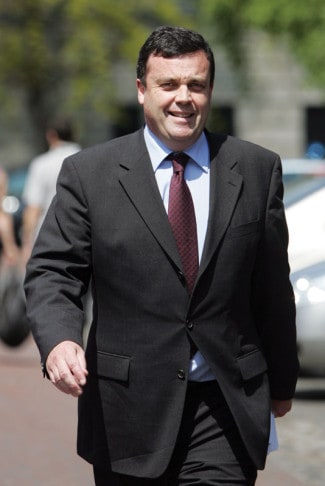Respected commentator Gillian Tett tells John Walsh why Ireland must negotiate with senior bondholders.
The credit crisis burned a lot of reputations among financial journalists and economists. Many of them were totally wrong-footed by the pace of the downturn. Fewer still saw it coming. There were exceptions, not least the Financial Times’ US managing editor Gillian Tett. She has emerged as one of the paper’s most influential columnists in recent times. Her seminal book on the crisis Fools Gold is a forensic analysis of how the credit crisis originated and unfolded. The financial instruments that were responsible for the biggest market crash since 1929 are explained in an accessible style.
Tett’s views command a lot of respect in the market. Last March, she published an article in which she compared two euro zone countries’ attempts to restore fiscal rectitude: Ireland and Greece. She argued that Ireland was taking the correct course of action and should be used as a template for other countries in similar circumstances.
The world has changed considerably since last March. Back then, Ireland was being rewarded by the bond markets for the actions it had taken to knock shape into the national coffers. But the summer months gave way to a series of damning reviews. The spectre of a default loomed large in many of the analyses about the state of the economy.
The spreads between Irish and German bonds have widened to record levels since the launch of the single currency. Tett says that Ireland is being unfairly punished. “I think what Ireland has done has been remarkable. It has taken proper steps to address the problem.
“Overall, I think Ireland has taken very impressive steps in its financial market regulation. I think its steps in fiscal retrenchment have been very impressive and I think the social cohesion it has shown so far has been very impressive.”
She argues that Ireland has been dragged down by a wider debt crisis. The periphery euro zone countries have come under increasing pressure from bond markets over concerns that a debt default by one member state would trigger a contagion effect throughout the region, which would, in turn, undermine the economic sovereignty of the most vulnerable member states.
At the start of the year, Ireland looked as if it was decoupling from the offender states – Portugal, Italy, Greece and Spain. There are two issues now at stake. The Government, in conjunction with the main Opposition parties, is preparing a four-year budget strategy that aims to take up to €5bn off the deficit in 2011 through a combination of spending cuts and tax increases. This move faces a growing chorus of critics who argue that it is too much of a shock for a fragile economy and it could trigger a debt deflationary spiral. The European Commission, meanwhile, is sticking to the 2014 timeframe.
Tett is broadly supportive of the massive fiscal retrenchment. “But there may be a case for easing up on the austerity programme but it really depends on the international environment and the level of growth.”
On top of a fiscal crisis, the Government has had to deal with a bank meltdown. The liability side of the domestic banks’ balance sheets had grown disproportionately large relative to the size of the country’s GDP in the boom years. Most of that lending was channelled into the construction sector. The property market crashed in 2007 which precipitated a near collapse of the banking system. Anglo Irish Bank has been nationalised and is in the process of being wound down. Both Bank of Ireland and AIB have to reach capital targets set out by the Financial Regulator Matthew Elderfield. Bank of Ireland has reached that target but there is a possibility that AIB could end up being majority State-owned if it cannot raise the capital through the market.
The bond markets have been turning the screw on Ireland as much for the parlous state of the banks as the yawning chasm between the actual budget deficit and the 3% limit imposed by the European Commission. Much of the problem is due to the fact that the total cost of bailing out the banks has crept upwards. The Government’s initial estimate for Anglo Irish Bank was €4bn. As of September 30th, that had risen to €34bn. If there is one thing markets do not like, it is uncertainty.
This, in turn, has prompted a highly charged debate about whether the Government was right to introduce the blanket guarantee of the banks in September 2008. The Minister for Finance Brian Lenihan has consistently argued that because of the unprecedented turmoil in the markets during that period, it was necessary to take a radical and unorthodox approach to shoring up investor confidence in Ireland. Moreover, because of the convulsions in the credit markets, it was necessary to include subordinated and senior debt in the guarantee, adds Lenihan.
“Yes, absolutely it was the right thing to do at the time. It had to be done,” says Tett.
But that was then. The bond markets are taking the view that the cost of bailing out the banks is putting an unbearable strain on the Government’s finances. Ireland, like most other EU states, has decided to put the burden of readjustment on the taxpayer. The alternative view is that bondholders should be made pay. Lenihan has been a vocal opponent of hosing down bondholders on the basis that it would damage the credibility of the Government and lead to higher borrowing costs.
There has now been a U-turn on that policy, with Anglo Irish Bank offering 20c in the euro on €1.65bn of subordinated debt and 5c in the euro on €330m of debt. Tett is in no doubt that bondholders have to share some of the losses.
She argues that it is incumbent upon the Government to renegotiate the terms of subordinated debt. “Taxpayers cannot be expected to shoulder all the losses. Bondholders have to get real. It would create a healthy culture if these investors were made take haircuts. It just proves that they have not being doing their homework.”
Restructuring senior debt is more problematic. It could lead to a much greater backlash from the market. “Yes, it is correct to say that it would cause reputational damage, but Ireland is already suffering reputational damage. The country is being pummelled in the bond markets. It could be that negotiating with senior bondholders is the lesser of two evils and we may be reaching that point soon.”
Euro woes/opportunities
Since the advent of the crisis, there has been a growing list of economists and commentators lining up to call time on the single currency. Tett says the crisis has been good and bad for the euro zone. “Bad in the way that exposed the flaws in the design and architecture of the euro zone institutions.”
But it needed a crisis to address these shortcomings, she argues. Brussels has set up a European Financial Stability Facility (EFSF) in response to the crisis, which Tett describes as a good start. “But much more needs to be done particularly in terms of supervision across the region. The ECB’s mandate is limited to price stability. That should be looked at in terms of: could it play a more active role in the future?.”
In the aftermath of the crisis, there was a lot of rhetoric coming from western governments about bringing financial markets to heel. The Obama administration came out with the Volcker Report, while the European Commission has come up with its own raft of plans.
Tett says some of the proposals that have emerged are a step in the right direction. She welcomes the increase in the banks’ capital base under the terms of Basel III; the reduction in the amount of leverage in the system and the move to have derivative trades done through an exchange. But there are still huge challenges ahead, not least the US government’s failure to tackle the troubled home loan giants Freddie Mae and Fannie Mac. “I would give western governments an A- or B+ for what they said they would do, but a B for results.”
Global macro imbalances were a big factor for the crisis with the US hoovering up two-thirds of global exports. Tett says the global economy is more imbalanced now than before the crisis. Is there a proxy trade war being waged in the currency markets? “Yes there is. At least there is a financial trade war.” She says that every emerging market was looking to maintain a competitive position against the dollar. “Everyone knows that this cannot continue, but nobody is willing to take the first step.”
It is not possible to put a timeframe on the global economy’s path to recovery. There are still a number of potential shocks to be worked through. “The markets could lose patience with the levels of public debt. US-China relations could snap. And then there is the continued problems with the currency markets.” Ominously, she concludes: “A double dip recession is entirely possible.”
Gillian Tett: International recognition
Gillian Tett is US managing editor of The Financial Times. In her previous role, she oversaw global coverage of the financial markets. In March 2009, she was named Journalist of the Year at the British Press Awards. In June 2009, her book Fool’s Gold won Financial Book of the Year at the inaugural Spear’s Book Awards.
In 2007, she was awarded the Wincott prize, the premier British award for financial journalism, for her capital markets’ coverage. She was named British Business Journalist of the Year in 2008.
She joined The Financial Times in 1993 and worked in the former Soviet Union and Europe, and in the economics team. In 1997, she was posted to Tokyo where she became the bureau chief, before returning in 2003 to become deputy head of the Lex column. She is the author of Saving the Sun; How Wall Street mavericks shook up Japan’s financial system and made billions.
Gillian Tett has a PhD in social anthropology from Cambridge University, based on research conducted in the former Soviet Union in the early 1990s. She speaks French, Russian, moderate Japanese and Persian.





